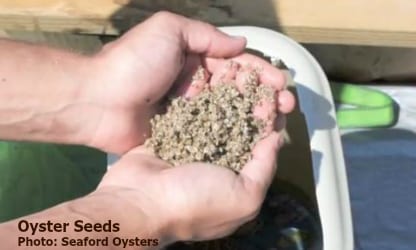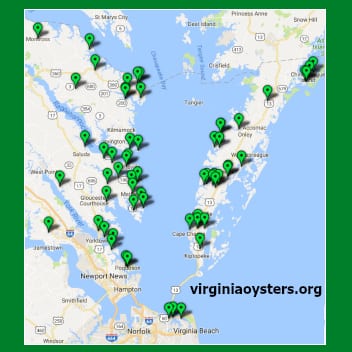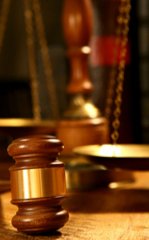STATE ACTION ALERT

Hearings This Week – Contact Virginia Legislators Today!
Use the online petitions to EMAIL the proper legislators then follow up with phone calls
>>online HB 1897 petition<<2nd House Subcmte Hearing Today 2/1/2017!
>>online SB 1529 petition<<2nd Senate Ag Cmte Hearing Thursday 2/2/2017!
Virginia House Bill 1897 (HB 1897) and Senate Bill 1529 (SB 1529) are companion bills introduced, respectively, by Delegate Nick Freitas and Senator Jill Holtzman Vogel to make it crystal clear that aquaculture is an agricultural activity under Virginia law. The legislation seeks not only to protect aquaculture in any zone that allows production agriculture but also to preserve the use of property for aquaculture that began prior to any change in zoning that later disallows production agriculture.
While Virginia’s aquaculture shellfish industry continues to grow and the Virginia Marine Resources Commission (MRC) strongly encourages gardening and farming of oysters and clams, the threat of being shutdown through local zoning changes is very real. York County zoning officials have pursued two Virginia oyster farmers, Greg Garrett and Anthony Bavuso, through the courts to shutter them; though both won their cases in the county circuit court, the York County Board of Supervisors successfully appealed to the Virginia Supreme Court, claiming that the oyster farmers were required to have a special use permit from the county in order to operate oyster farms at their residences which were zoned agricultural. When Bavuso then applied for the permit, the county refused to issue one.
Passage of the current legislation is imperative to protect Virginia’s aquacultural heritage. A bill passed in 2014 to clarify that Virginia law recognized aquaculture as an agricultural activity. In response, York County zoning officials quickly changed the zoning to prohibit agriculture at York Point which includes Bavuso’s neighborhood. Like many oyster farmers, Bavuso holds licenses issued by the Virginia MRC for “bottom shellfish aquaculture” on state-owned bottomland beneath tidal waters adjacent to his waterfront residence. He uses his land for storing oyster cages and other equipment related to his business, growing seed oysters, docking his workboat at his pier, and offloading harvested oysters for transport to market. Watch Garrett’s video describing the situation in 2012.
According to the Virginia MRC, clam and oyster farming, also known as aquaculture, is not only a multi-million dollar industry in Virginia, it also provides important environmental benefits that help to clean waterways by removing nitrogen and phosphorus to control algae bloom. Per MRC, “a single adult oyster can purge 50 gallons of water a day!”
Environmentally-conscious consumers value local shellfish operations not only for quality seafood and as sustainable alternatives to imports and depleting wild stock but also for providing a sustainable habitat for fish and crabs. Oyster gardening under private piers and along the shoreline of privately owned waterfront property can be a viable option as well. The website (virginiaoysters.org) of the Virginia Aquaculture Oyster Growers even offers a flavor guide for oysters harvested from the various regions of the Chesapeake Bay area. A multitude of oyster growers are identified in a directory and on the VAO Grower Map. As witnessed with Forbidden Oysters, simple changes in zoning could have a devastating effect.
 Throughout this legislative session, please attend hearings in support of the bills. Some may be scheduled on short notice but your presence makes a difference.
Throughout this legislative session, please attend hearings in support of the bills. Some may be scheduled on short notice but your presence makes a difference.
General Assembly Building
201 N 9th St
Capitol Square
Richmond, VA 23219 (directions)
HB 1897: Jan. 25, Wed. 4:00 pm – CCT Subcommittee #2location: 7th Floor West Conference Room
SB 1529: Jan. 26, Thu. afternoon [½-hour after adjournment] – Senate Ag Committeelocation: Senate Room B
#1 Take Action on HB 1897 – Contact House Subcommittee Members
Use the online HB 1897 petition to EMAIL all members of the House Counties, Cities and Towns Sub-Committee #2, then follow up with phone calls to each office. Ask to speak to the delegate or his/her legislative assistant, give your comments, and ask the delegate to VOTE YES on HB 1897. Your calls are important. If you’re short on time, please make as many calls as you can.
See “Talking Points” and “HB 1897 Contact Information” below. The online petition service will EMAIL this message followed by your comments and initials: Vote YES on HB 1897 – Protect Virginia Aquaculture Heritage.
#2 Take Action on SB 1529 – Contact Senate Committee Members
Use the online SB 1529 petition to EMAIL all members of the Senate Committee on Agriculture, Conservation and Natural Resources, then follow up with phone calls to each office. Ask to speak to the senator or his/her legislative assistant, give your comments, and ask the senator to VOTE YES on SB 1529. Your calls are important. If you’re short on time, please make as many calls as you can.
See “Talking Points” and “SB 1529 Contact Information” below. The online petition service will EMAIL this message followed by your comments and initials: I urge you to vote YES on SB 1529 to protect heritage aquaculture in Virginia.
#3 Take Action – Attend Hearings
If you are able, please attend the hearings this week:
- HB 1897: Jan. 25, Wed. 4:00 pm – CCT Subcommittee #2, General Assembly Building, 7th Floor West Conference Room
- SB 1529: Jan. 26, Thu. afternoon [½-hour after adjournment] – Senate Ag Committee, General Assembly Building, Senate Room B
Location:
7th Floor West Conference Room
General Assembly Building
201 N 9th St
Capitol Square
Richmond, VA 23219 (directions)
View Capitol Square Map
NOTE: The General Assembly Building is separate from the Virginia State Capitol building.
Talking Points
Include your own comment about any of these points in your communications with legislators and their staffers. You can add your own personal story and concerns about the vulnerability of aquaculture to arbitrary zoning changes.
- 1. Sustainable aquaculture should be protected from overzealous zoning boards. York County is a prime example of what can go awry when the law can be skirted by a calculated zoning change.
- 2. Protecting aquaculture creates jobs and keeps more dollars in the local economy.
- 3. The shellfish aquaculture farmers in Virginia are environmental stewards of the Chesapeake waterways and are crucial to preserving and renewing the habitat for fish and crabs for which Virginia is renowned. For example, oysters naturally improve water quality by removing especially nitrogen and phosphorus thereby countering algae bloom fed by the run-off.
- 4. Shellfish aquaculture is a regulated industry monitored in Virginia by the Marine Resources Commission (MRC) and, as such, oyster farmers and other seafood cultivators are conscientious in complying with the various requirements. A forced shutdown because of local zoning changes is unjustifiable and injurious to the producer as well as the consumers who seek the aquacultural products and results in a setback for the environment.
Use the online petitions to EMAIL the proper legislators then follow up with phone calls
>>online HB 1897 petition<<
>>online SB 1529 petition<<
Summary of HB 1897 – Bill Status & Other Details
Zoning; aquaculture in agricultural zone; preexisting use. Provides that any aquaculture use that was established on property that was zoned as an agricultural district at the time, but later was rezoned to disallow agriculture, is a valid nonconforming use of the property. The bill also amends a 2014 Act of Assembly that expanded the definition of agricultural products to provide that the act was declaratory of existing law.
- Bill text as introduced by Delegate Nicholas Freitas on January 10, 2017
- Bill referred to the House Committee on Counties, Cities and Towns (CCT) on January 10, 2017
- Bill assigned to the House CCT Subcommittee #2 on January 16, 2017; hearing held January 25 and scheduled for February 1.
You can also post comments at RichmondSunlight.com for the bill HB 1897. To find your state legislators by entering your address, click here.
Use the online HB 1897 petition to EMAIL all House subcommittee members then follow up with phone calls.
Summary of SB 1529 – Bill Status & Other Details
Zoning; aquaculture in agricultural zone; preexisting use. Provides that any aquaculture use that was established on property that was zoned as an agricultural district at the time, but later was rezoned to disallow agriculture, is a valid nonconforming use of the property. The bill also amends a 2014 Act of Assembly that expanded the definition of agricultural products to provide that the act was declaratory of existing law.
- Bill text as introduced by Senator Jill Holtzman Vogel on January 20, 2017
- Bill referred to the SenateCommittee on Agriculture, Conservation and Natural Resources on January 20, 2017; meetings are typically scheduled for 1/2-hour after Senate adjourns on Thursdays.
- Bill posted on Senate committee docket for January 26, 2017 and again for February 2.
You can also post comments at RichmondSunlight.com for the bill SB 1529. To find your state legislators by entering your address, click here.
Use the online SB 1529 petition to EMAIL all Senate committee members then follow up with phone calls.
Contact Information – House Subcommittee
You can use the online HB 1897 petition to EMAIL all members of the Sub-Committee #2 of the House Committee on Counties, Cities and Towns. Follow up with courteous phone calls to each subcommittee member. Remember that phone calls and in-person visits are more effective than emails. Be sure to include Talking Points in your communications.
Contact information for the Virginia House Counties, Cities and Towns Sub-Committee #2:
Christopher Stolle, Chairman (R-District 83)
(804) 698-1083
email: [email protected]
Daniel W. Marshall III (R – District 14)
(804) 698-1014
email: [email protected]
James [Will] Morefield (R – District 3)
(804) 698-1003
email: [email protected]
Tony O. Wilt (R – District 26)
(804) 698-1026
email: [email protected]
Keith M. Hodges (R – District 98)
(804) 698-1098
email: [email protected]
Michael J. Webert (R – District 18)
804) 698-1018
email: [email protected]
Todd E. Pillion (R – District 4)
(804) 698-1004
email: [email protected]
Stephen E. Heretick (D – District 79)
(804) 698-1079
email: [email protected]
Michael P. Mullin (D – District 93)
(804) 698-1079
email: [email protected]
E.E. Cliff Hayes Jr. (D – District 93)
804) 698-1077
email: [email protected]
To email all the sub-committee members at once, you can copy and paste this list:
[email protected], [email protected], [email protected], [email protected], [email protected], [email protected], [email protected], [email protected], [email protected], [email protected], [email protected]
View Virginia District Map that lets you identify legislators by clicking on a location on the Virginia map or by entering an address or instead, go to RichmondSunlight.com/your-legislators
Contact Information – Senate Committee
You can use the online SB 1529 petition to EMAIL all members of the Senate Committee on Agriculture, Conservation and Natural Resources. Follow up with courteous phone calls to each committee member. Remember that phone calls and in-person visits are more effective than emails. Be sure to include Talking Points in your communications.
Contact information for the Virginia Senate Committee on Agriculture, Conservation and Natural Resources:
Richard Stuart (Chairman) (R – District 28)
(804) 698-7528
[email protected]
Emmett Hanger (R – District 24)
(804) 698-7524
[email protected]
Frank Ruff (R – District 15)
(804) 698-7515
[email protected]
Mark Obenshain (R – District 26)
(804) 698-7526
[email protected]
J. Chapman Petersen (D – District 34)
(804) 698-7534
[email protected]
David Marsden (D – District 37)
(804) 698-7537
[email protected]
William Stanley (R – District 20)
(804) 698-7520
[email protected]
Richard Black (R – District 13)
(804) 698-7513
[email protected]
Adam Ebbin (D – District 30)
(804) 698-7530
[email protected]
Lynwood Lewis (D – District 6)
(804) 698-7506
[email protected]
A. Benton Chafin (R – District 38)
(804) 698-7538
[email protected]
Rosalyn Dance (D – District 16)
(804) 698-7516
[email protected]
David Suetterlein (R – District 19)
(804) 698-7519
[email protected]
T. Montgomery Mason (D – District 1)
(804) 698-7501
[email protected]
Jennifer McClellan (D – District 9)
(804) 698-7509
[email protected]
To email all the Senate committee members at once, you can copy and paste this list:
[email protected], [email protected], [email protected], [email protected], [email protected], [email protected], [email protected], [email protected], [email protected], [email protected], [email protected], [email protected], [email protected], [email protected], [email protected], [email protected]
View Virginia District Map that lets you identify legislators by clicking on a location on the Virginia map or by entering an address or instead, go to RichmondSunlight.com/your-legislators
YOUR FUND AT WORK

Services provided by FTCLDF go beyond legal representation for members in administrative and judicial court cases.
Educational and policy work also provide an avenue for FTCLDF to build grassroots activism to create the most favorable regulatory climate possible. In addition to advising on bill language, FTCLDF supports favorable legislation via action alerts, social media outreach, and the online petition service.
You can help FTCLDF by becoming a member or donating today.

 Anyone wanting to make a contribution to support the work of FTCLDF can make a donation online or send a check to:
Anyone wanting to make a contribution to support the work of FTCLDF can make a donation online or send a check to:
FTCLDF
8116 Arlington Blvd, # 263
Falls Church, VA 22042
Prefer to make a tax-deductible donation? Donate online here.
You may also contact us by email at [email protected] or call 703-208-FARM (3276). Thanks for your support.
VIDEO – Seaford Oyster Company
In this video, Seaford Oyster Company’s Anthony Bavuso shows the process of planting, harvesting and eating oysters.
In this video, Forbidden Oyster’s Greg Garrett explains the ordeal he was facing in 2012. Let’s ensure no more aquaculture farmers n Virginia are shut down simply by zoning changes.
Soon after Greg Garrett began growing and selling oysters, York County made efforts to outlaw his and other residential aquaculture operations. While he is zoned for agriculture, and can grow pigs, chickens, etc., the York County Board of Supervisors has done its best to define aquaculture as not a form of agriculture, an opinion contrary to that of VA, the United States, and many experts, some of whose statements and documentation Garrett presented before the County in hearings. While runoff from the fertilizer on many farms has polluted the Chesapeake Bay and its tributaries, oysters are nature’s number one cleaners of VA waters. Also, with a lagging economy like most of the United States, and imported oysters all over VA, one would think that the county would promote Greg Garrett’s operation, but this has been quite the contrary. Greg’s grandfather times 14, the founder of Yorktown, would be appalled.Read full description at YouTube.com
Read: The FORBIDDEN Oyster story of government abuse gets WORSE